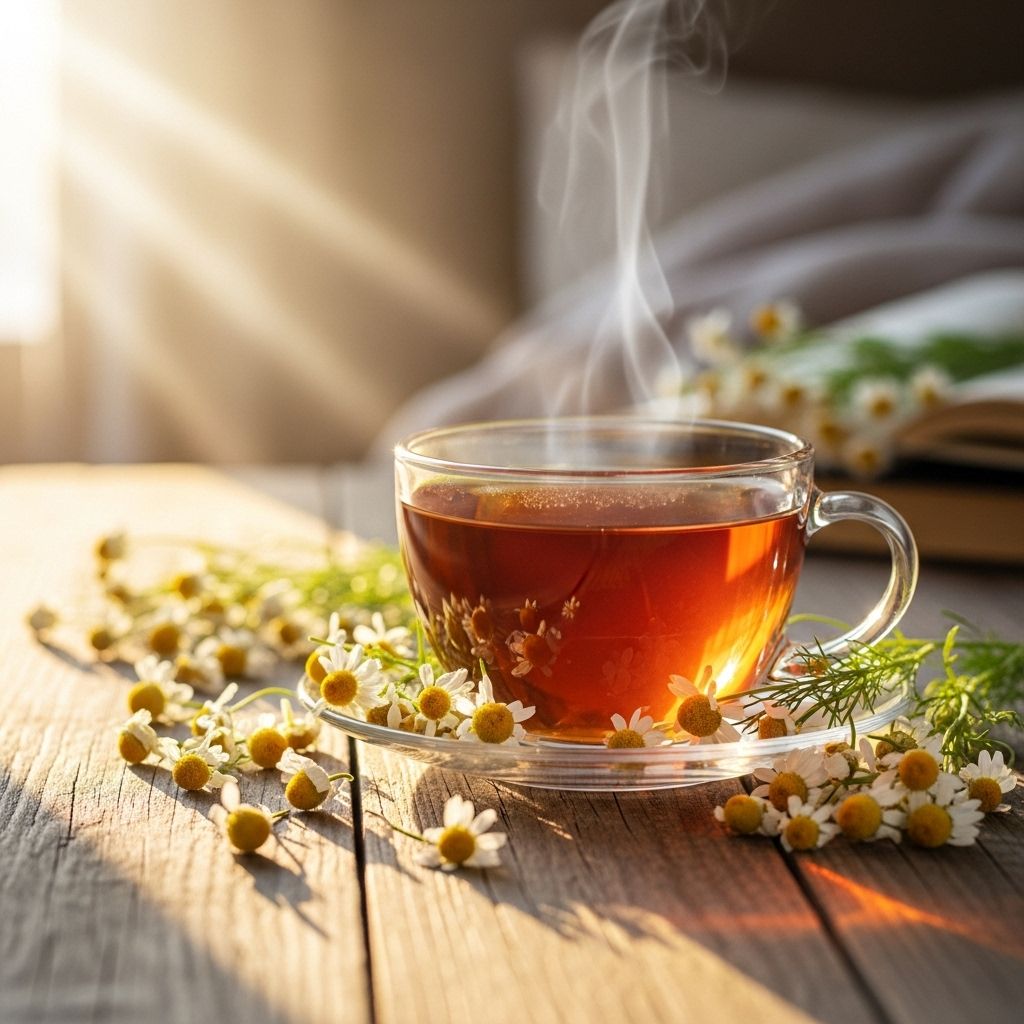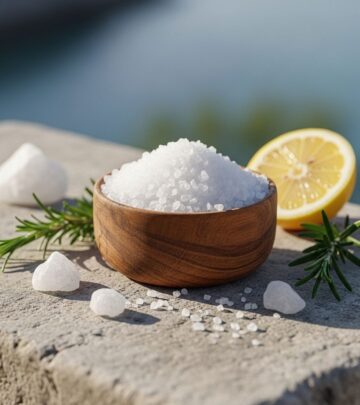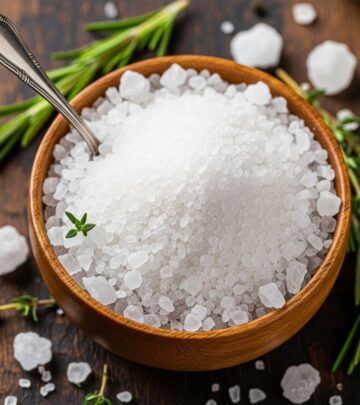Chamomile Tea Benefits: Discover the Healing Power of This Ancient Herbal Brew
A soothing herbal brew that calms the mind, soothes digestion, and nurtures your wellbeing.

Chamomile tea has been treasured for centuries, celebrated across cultures as a natural remedy for a spectrum of health concerns. From easing restless nights to soothing digestive discomfort, chamomile’s gentle floral brew is a staple in traditional and holistic wellness routines. This comprehensive guide will explore the science-backed benefits, traditional uses, preparation tips, side effects, and frequently asked questions about chamomile tea.
What Is Chamomile Tea?
Chamomile tea is an aromatic, herbal infusion made from the dried flowers of the chamomile plant, primarily the German cultivar (Matricaria chamomilla) and the Roman cultivar (Chamaemelum nobile). Its calming flavor and aroma have made it a popular nighttime beverage. The plant’s delicate, daisy-like flowers are steeped in hot water to extract beneficial compounds, most notably antioxidants such as apigenin and flavonoids.
- Belongs to the Asteraceae (daisy) family
- Caffeine-free and non-habit forming
- Used for centuries in both traditional and modern herbal medicine
Key Health Benefits of Chamomile Tea
Chamomile tea offers a variety of scientifically supported health benefits, making it a versatile addition to your daily wellness routine.
1. Promotes Better Sleep and Fights Insomnia
Chamomile is heralded for its natural sedative properties, making it one of the most popular herbal teas for promoting relaxation and sleep. Apigenin, a powerful antioxidant in chamomile, binds to receptors in the brain to reduce anxiety and induce sleepiness.
- Helps fall asleep faster and improves sleep quality
- Non-habit forming alternative to pharmaceutical sleep aids
- Recommended as a caffeine-free evening beverage
2. Eases Stress and Reduces Anxiety
The calming effects of chamomile extend beyond sleep. Chamomile tea is a traditional remedy for lowering stress, managing anxiety, and reducing nervous tension. Contemporary research shows that it can help decrease cortisol, the body’s primary stress hormone, and support emotional equilibrium.
- Promotes mental clarity and relaxation
- Can be enjoyed throughout the day or as part of a nighttime routine
- Safe for regular consumption and suitable for all ages
3. Supports Digestive Health and Relieves Stomach Discomfort
Traditionally consumed after meals, chamomile tea is renowned for its digestive benefits. Its natural anti-inflammatory and antispasmodic actions help soothe the gut, expel gas, and alleviate cramping.
- Reduces bloating and indigestion
- Calms an upset or nervous stomach
- Can help ease symptoms related to irritable bowel syndrome (IBS)
4. May Help Manage Diabetes and Lower Blood Sugar
Recent studies suggest that chamomile tea may aid in managing blood sugar levels for people with diabetes. Its antioxidants combat oxidative stress and may reduce the risk of diabetes-related complications.
- May support lower fasting blood glucose
- Acts as a complementary therapy—should not replace prescribed medication
- May lower oxidative stress in the body
5. Eases Menstrual Pain and Cramps
Painful periods are a common concern for many, and chamomile’s antispasmodic qualities can offer much-needed relief. Studies show that regular consumption can reduce the intensity and duration of menstrual cramps.
- Acts as a muscle relaxant for uterine muscles
- Soothes mood swings associated with menstruation
- Traditionally recommended for women’s wellness
6. Boosts Immune Health
Chamomile tea’s bioactive compounds possess antibacterial and immune-supportive properties, helping the body fight infections and supporting overall wellness.
- Traditional remedy for colds, sore throat, and flu
- May reduce symptoms of common respiratory conditions
- Contains flavonoids with antioxidant action
7. Enhances Skin Health and Heals Minor Wounds
Chamomile’s anti-inflammatory and antioxidant effects benefit the skin, both when consumed as tea and sometimes when applied topically. Drinking chamomile tea helps reduce internal inflammation that can manifest as skin irritation or redness.
- May improve complexion and support radiant skin
- Traditionally used for eczema, rashes, and wound healing
- Contains skin-soothing botanicals such as apigenin
Other Potential Benefits of Chamomile Tea
- Oral health: May help heal gum inflammation and mouth ulcers due to antimicrobial properties
- Supports heart health: The antioxidants in chamomile may support cardiovascular wellness
- Soothes sore muscles and headaches: Muscle relaxant effects may help ease tension headaches and mild body aches
How to Make Chamomile Tea at Home
Preparing a fresh, fragrant cup of chamomile tea is easy and takes only a few minutes:
- Use one to two teaspoons of dried chamomile flowers per cup of boiling water.
- Steep the flowers for 5-10 minutes (the longer, the stronger the tea).
- Strain and enjoy hot or cold. For extra flavor, add honey, lemon, or a touch of mint.
Best Time to Drink Chamomile Tea
- Before bedtime: To enhance sleep quality and aid relaxation
- After meals: For digestive support
- During episodes of stress: To promote a sense of calm
Possible Side Effects and Precautions
Chamomile tea is considered safe for most adults and children. However, the following precautions should be noted:
- Allergic reactions: People with allergies to plants in the Asteraceae family (such as ragweed, daisies, marigolds) may have an increased risk of reactions like skin rash, itching, or swelling
- Pregnancy: It is advisable for pregnant and nursing women to consult a healthcare provider before consuming chamomile tea, as its safety is not fully established in these groups
- Medication interactions: Chamomile may interact with blood thinners, sedatives, and other medications—seek medical advice if unsure
Comparing German vs. Roman Chamomile
| Attribute | German Chamomile | Roman Chamomile |
|---|---|---|
| Botanical Name | Matricaria chamomilla | Chamaemelum nobile |
| Flavor Profile | Mild, sweet, apple-like | Slightly bitter, earthy |
| Main Uses | Most common for teas and infusions | Often used in essential oils and aromatherapy |
| Region | Mainly Europe and Western Asia | Native to Western Europe and North Africa |
Tips for Choosing and Storing Chamomile Tea
- Opt for organic, loose-leaf chamomile or tea bags with whole flowers for best flavor and potency.
- Store chamomile in a cool, dry place, in an airtight container to preserve freshness.
- Use within 6-12 months for optimal taste and efficacy.
Frequently Asked Questions (FAQs)
Q1: Can I drink chamomile tea every day?
Yes, chamomile tea is safe for daily use for most people and can be a healthy addition to your regular wellness routine. Those with allergies or medical conditions should consult their healthcare provider first.
Q2: Is chamomile tea safe for children?
Chamomile tea is generally safe for children in moderate, age-appropriate servings. Always start with a small amount and be alert for any signs of allergy.
Q3: Does chamomile tea have caffeine?
No, chamomile tea is naturally caffeine-free, making it suitable for evening consumption and those sensitive to caffeine.
Q4: Can chamomile tea help with colds and sore throats?
Chamomile tea has mild soothing and antibacterial effects, so it may ease sore throats and support immune response during a cold.
Q5: Are there any serious side effects?
While rare, those allergic to chamomile or related plants may experience adverse reactions. Interactions with some medications can occur, so consult your doctor if uncertain, especially if pregnant or breastfeeding.
Conclusion: Should You Add Chamomile Tea to Your Routine?
From ancient Egypt to modern wellness rituals, chamomile tea remains a beloved remedy for better sleep, relaxation, digestive harmony, and radiant skin. Its caffeine-free nature and gentle flavors make it an inviting beverage for all ages and most health backgrounds. Incorporate chamomile tea into your daily habit and experience its calming, restorative benefits first-hand!
References
- https://www.tarteletteblog.com/health-benefits-chamomile-tea/
- https://www.tochatea.com/blogs/news/the-ultimate-guide-to-chamomile-tea-benefits-types-uses
- https://www.medicalnewstoday.com/articles/320031
- https://www.theteamakers.co.uk/blogs/news/the-ultimate-guide-to-chamomile-tea
- https://www.webmd.com/diet/supplement-guide-chamomile
- https://pmc.ncbi.nlm.nih.gov/articles/PMC9611340/
- https://www.health.harvard.edu/nutrition/the-health-benefits-of-3-herbal-teas
- https://dragonflytea.com/blogs/our-blog/camomile-tea-benefits
Read full bio of Sneha Tete












